Alfa Romeo Junior vs Citroen Berlingo – Differences & prices compared
Both models have their strengths – but which one suits you more?
Compare performance, efficiency, price and space directly: Alfa Romeo Junior or Citroen Berlingo?
Costs and Efficiency:
When it comes to price and running costs, the biggest differences usually appear. This is often where you see which car fits your budget better in the long run.
Citroen Berlingo has a clearly perceptible advantage in terms of price – it starts at 20200 £, while the Alfa Romeo Junior costs 25700 £. That’s a price difference of around 5494 £.
Fuel consumption also shows a difference: Alfa Romeo Junior manages with 4.80 L and is therefore a bit more efficient than the Citroen Berlingo with 5.50 L. The difference is about 0.70 L per 100 km.
In terms of energy consumption, the advantage goes to the Alfa Romeo Junior: with 15.10 kWh per 100 km, it’s slightly more efficient than the Citroen Berlingo with 18 kWh. That’s a difference of about 2.90 kWh.
As for range, the Alfa Romeo Junior performs somewhat better – achieving up to 410 km, about 67 km more than the Citroen Berlingo.
Engine and Performance:
Power, torque and acceleration say a lot about how a car feels on the road. This is where you see which model delivers more driving dynamics.
When it comes to engine power, the Alfa Romeo Junior has a decisively edge – offering 280 HP compared to 136 HP. That’s roughly 144 HP more horsepower.
In acceleration from 0 to 100 km/h, the Alfa Romeo Junior is convincingly quicker – completing the sprint in 5.90 s, while the Citroen Berlingo takes 11.20 s. That’s about 5.30 s faster.
In terms of top speed, the Alfa Romeo Junior performs somewhat better – reaching 206 km/h, while the Citroen Berlingo tops out at 184 km/h. The difference is around 22 km/h.
There’s also a difference in torque: Alfa Romeo Junior pulls somewhat stronger with 345 Nm compared to 300 Nm. That’s about 45 Nm difference.
Space and Everyday Use:
Cabin size, boot volume and payload all play a role in everyday practicality. Here, comfort and flexibility make the difference.
Both vehicles offer seating for 5 people.
In curb weight, Alfa Romeo Junior is to a small extent lighter – 1380 kg compared to 1530 kg. The difference is around 150 kg.
In terms of boot space, the Citroen Berlingo offers clearly more room – 1050 L compared to 415 L. That’s a difference of about 635 L.
When it comes to payload, Citroen Berlingo clearly takes the win – 840 kg compared to 420 kg. That’s a difference of about 420 kg.
Who comes out on top?
Overall, the Alfa Romeo Junior shows itself to be outperforms in nearly all aspects and secures the title of DriveDuel Champion.
It convinces with the more balanced overall package and proves to be the more versatile choice for everyday use.
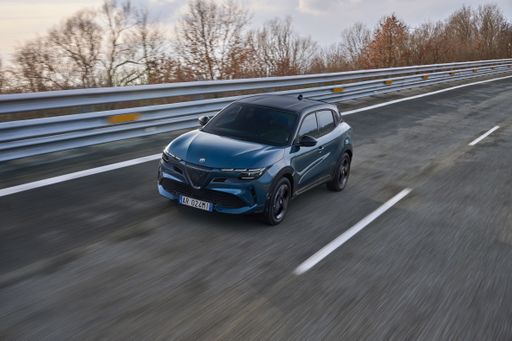 @ Alfa Romeo / Stellantis Media
@ Alfa Romeo / Stellantis Media
Alfa Romeo Junior
Alfa Romeo Junior
The Alfa Romeo Junior captures the essence of Italian design with its sleek lines and compact dimensions, making it an icon of elegance and performance. With a spirited driving experience and a charming retro aesthetic, it appeals to enthusiasts and casual drivers alike. This delightful car embodies the brand's rich heritage while remaining a fun and engaging option for those seeking a unique automotive experience.
details @ Alfa Romeo / Stellantis Media
@ Alfa Romeo / Stellantis Media
 @ Alfa Romeo / Stellantis Media
@ Alfa Romeo / Stellantis Media
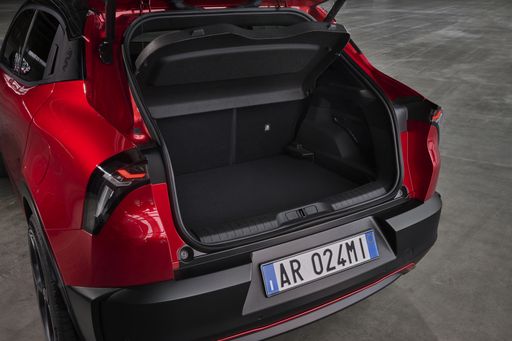 @ Alfa Romeo / Stellantis Media
@ Alfa Romeo / Stellantis Media
Citroen Berlingo
The Citroen Berlingo is widely celebrated for its spacious interior and practical design, making it an ideal choice for those seeking a versatile vehicle. Its high roof provides ample headroom, enhancing comfort for both driver and passengers, while the modular seating offers exceptional adaptability for transporting various loads. With its distinctive French styling and emphasis on functionality, the Berlingo stands out in the competitive market of multi-purpose vehicles.
details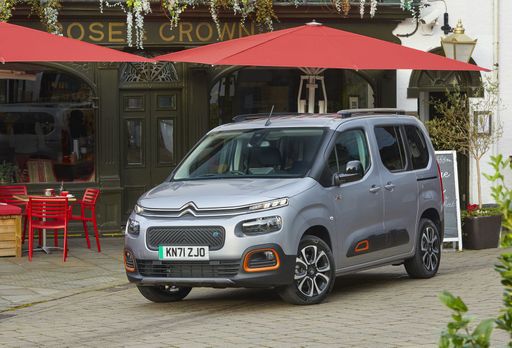 @ Citroën / Stellantis Media
@ Citroën / Stellantis Media
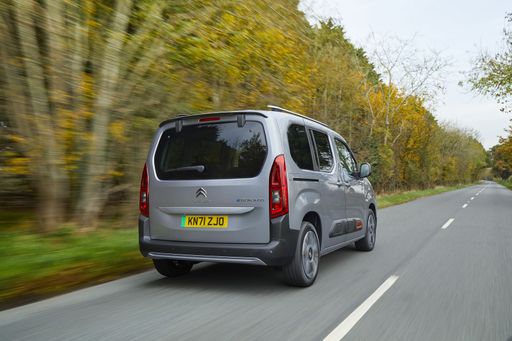 @ Citroën / Stellantis Media
@ Citroën / Stellantis Media
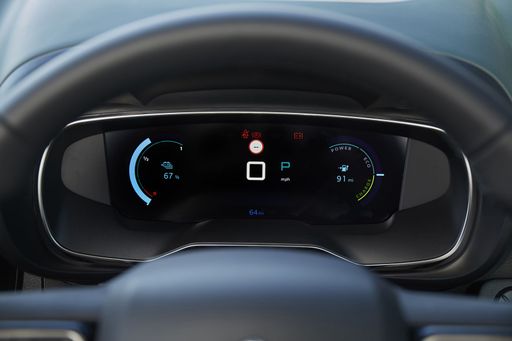 @ Citroën / Stellantis Media
@ Citroën / Stellantis Media
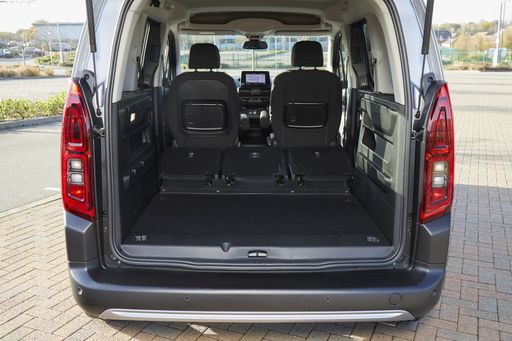 @ Citroën / Stellantis Media
@ Citroën / Stellantis Media
 @ Alfa Romeo / Stellantis Media
@ Alfa Romeo / Stellantis Media
|
 @ Citroën / Stellantis Media
@ Citroën / Stellantis Media
|
|
|
|
Costs and Consumption |
|
|---|---|
|
Price
25700 - 41600 £
|
Price
20200 - 34700 £
|
|
Consumption L/100km
4.8 - 5.4 L
|
Consumption L/100km
5.5 - 5.8 L
|
|
Consumption kWh/100km
15.1 - 17.5 kWh
|
Consumption kWh/100km
18 - 18.7 kWh
|
|
Electric Range
344 - 410 km
|
Electric Range
334 - 343 km
|
|
Battery Capacity
0.4 - 51 kWh
|
Battery Capacity
46 kWh
|
|
co2
0 - 119 g/km
|
co2
0 - 151 g/km
|
|
Fuel tank capacity
44 - 45 L
|
Fuel tank capacity
50 L
|
Dimensions and Body |
|
|---|---|
|
Body Type
SUV
|
Body Type
High Roof Estate
|
|
Seats
5
|
Seats
5
|
|
Doors
5
|
Doors
4 - 5
|
|
Curb weight
1380 - 1689 kg
|
Curb weight
1530 - 1881 kg
|
|
Trunk capacity
340 - 415 L
|
Trunk capacity
775 - 1050 L
|
|
Length
4173 mm
|
Length
4403 - 4753 mm
|
|
Width
1781 mm
|
Width
1848 mm
|
|
Height
1505 - 1538 mm
|
Height
1844 - 1849 mm
|
|
Max trunk capacity
1205 - 1280 L
|
Max trunk capacity
-
|
|
Payload
390 - 420 kg
|
Payload
509 - 840 kg
|
Engine and Performance |
|
|---|---|
|
Engine Type
Electric, Petrol MHEV
|
Engine Type
Diesel, Electric
|
|
Transmission
Automatic
|
Transmission
Manuel, Automatic
|
|
Transmission Detail
Dual-Clutch Automatic, Reduction Gearbox
|
Transmission Detail
Manual Gearbox, Automatic Gearbox, Reduction Gearbox
|
|
Drive Type
Front-Wheel Drive, All-Wheel Drive
|
Drive Type
Front-Wheel Drive
|
|
Power HP
136 - 280 HP
|
Power HP
102 - 136 HP
|
|
Acceleration 0-100km/h
5.9 - 9.1 s
|
Acceleration 0-100km/h
11.2 - 13.2 s
|
|
Max Speed
150 - 206 km/h
|
Max Speed
132 - 184 km/h
|
|
Torque
230 - 345 Nm
|
Torque
250 - 300 Nm
|
|
Number of Cylinders
3
|
Number of Cylinders
4
|
|
Power kW
100 - 207 kW
|
Power kW
75 - 100 kW
|
|
Engine capacity
1199 cm3
|
Engine capacity
1499 cm3
|
General |
|
|---|---|
|
Model Year
2024 - 2025
|
Model Year
2024 - 2025
|
|
CO2 Efficiency Class
A, C, D
|
CO2 Efficiency Class
E, A
|
|
Brand
Alfa Romeo
|
Brand
Citroen
|
What drive types are available for the Alfa Romeo Junior?
Available configurations include Front-Wheel Drive or All-Wheel Drive.
The prices and data displayed are estimates based on German list prices and may vary by country. This information is not legally binding.
